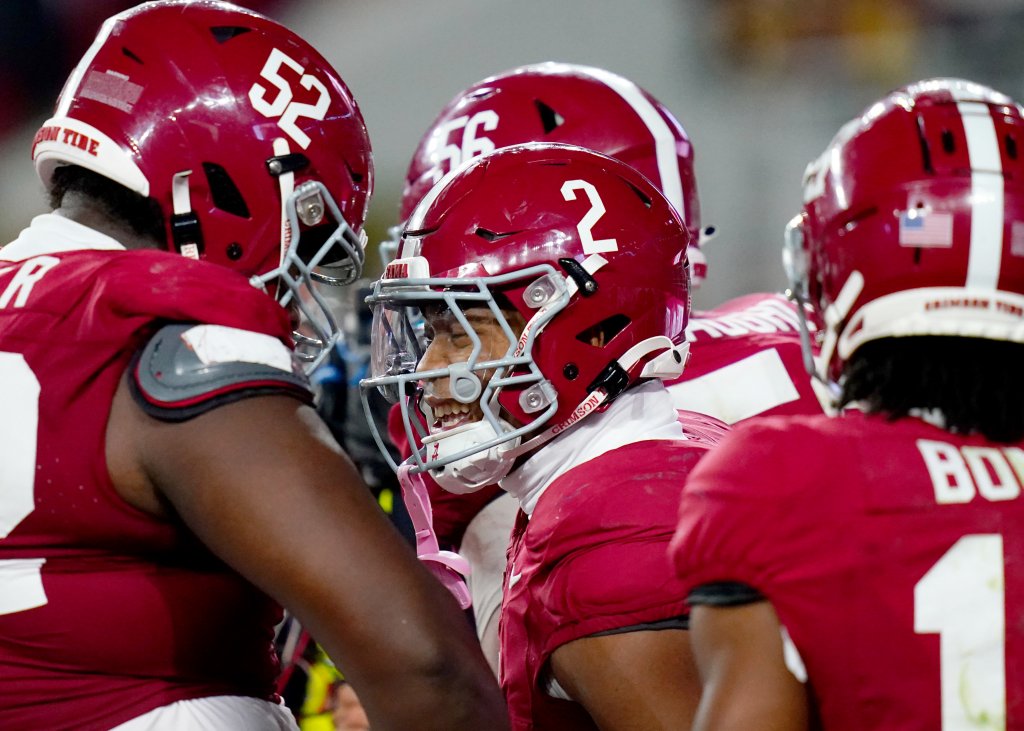Alabama Gaming Plan Passes Out of House, Now Heads to Senate
by Robert Linnehan in Sports Betting News
Updated Feb 15, 2024 · 1:45 PM PST
Nov 4, 2023; Tuscaloosa, Alabama, USA; Alabama Crimson Tide running back Jase McClellan (2) celebrates his touchdown against the LSU Tigers during the second half at Bryant-Denny Stadium. Alabama Crimson Tide defeated the LSU Tigers 42-28. Mandatory Credit: John David Mercer-USA TODAY SportsThe Alabama House of Representatives passed two expansive gaming bills this afternoonThe bills will legalize Alabama casinos, sports betting, and a lottery through a constitutional amendmentThe bills will now move to the Senate
An expansive Alabama gaming plan has been approved by the House of Representatives.
The House approved bills HB 151 and HB 152 this afternoon by the necessary three-fifths majority. If also approved by the Senate, Alabama voters will have the final say on legalized casinos, sports betting, and a lottery in the November general election.
If the new gaming approved, legislators predict Alabama could see an influx of more than $1.2 billion in new annual revenue.
Final Say at 2024 General Election?
Rep. Chris Blackshear (R-80) led the House floor discussion on bills HB 151 and HB 152, which call for the legalization of us to seven casinos, in-person and online sports betting, and a state lottery to support Alabama education. Additionally, Alabama will be allowed to negotiate a compact with the Poarch Band of Creek Indians to license the tribe for its existing three casinos on tribal land and one additional facility off tribal land.
HB 151 would be the triggering mechanism for the bill, which requires a constitutional amendment be approved by Alabama voters during the 2024 November general election.
Gambling is happening in Alabama every single day, Blackshear noted. It’s time for the state to regulate the industry and take advantage of the additional annual gaming revenue.
“One, we have gambling going on in Alabama today. Two, we have illegal sportsbooks, gambling halls, casinos and more. It’s not capped, it’s not controlled, or taxed in any way whatsoever. The final point I’d like to make is the people want to vote on this,” he said.
The House of Representatives approved HB 151 by a 70-32 vote and HB 152 by 67-31 vote. If approved by the Senate, Alabama voters will have the final say on legalization in the November 2024 general election.
The last time Alabama residents had the chance to approve expanded gaming was in 1999 when they voted down the formation of a state lottery.
Rep. Rolanda Hollis (D-58) said its time for Alabama to keep millions of dollars in revenue from crossing the border into other states with legalized gaming.
“Every year the state of Alabama pays for infrastructure in other states, kids to go to school in other states, and we should bring that money home,” she said.
Gaming Bill Details
The bills, if approved by a three-fifths majority the Senate, will establish an Alabama Gaming Commission to license and regulate the conduct of all sports wagering, charitable gaming activities, lotteries, and casino gaming activities in the state. The bills will also create the Alabama Gaming Enforcement Division, which will include the power to police all gaming activities in the state and “work to eradicate unlawful gaming and gaming-related activities,” the legislators wrote.
Casinos will be taxed at a rate of 24% of net gaming revenue and 95% of total gaming revenue will be allocated to the state’s Gaming Trust Fund every month. A percentage of the revenues will then be distributed among municipalities where the casinos are located.
Casino licenses will be valid for a 15-year term. An extended initial license term could be granted by the gaming commission if the applicant proposes to make a minimum capital investment of $500 million at the proposed site. Casino license fees shall not be less than $5 million.
Sports betting will be taxed at 17% of net gaming revenue, with 90% of the revenue allocated to the Gaming Trust Fund and 10% to be allocated among each county commission to be used “exclusively for law enforcement purposes of the respective sheriff’s department.”
A state education lottery will also be created.
Fiscal estimates show that legalized gaming, casinos, and lottery through these bills can bring in between $935.6 million to $1.214 billion annually. This breaks down as follows:
Sports betting is estimated to be between $15 million to $42.5 million annuallyGaming revenue is estimated to be between $315 million and $492.2 million annuallyLottery revenue is estimated to be between $305.6 million to $379.4 million annuallyGaming compact revenue estimated at $300 million annually


